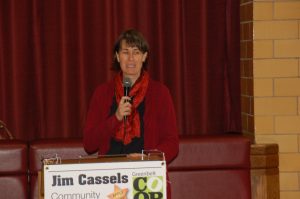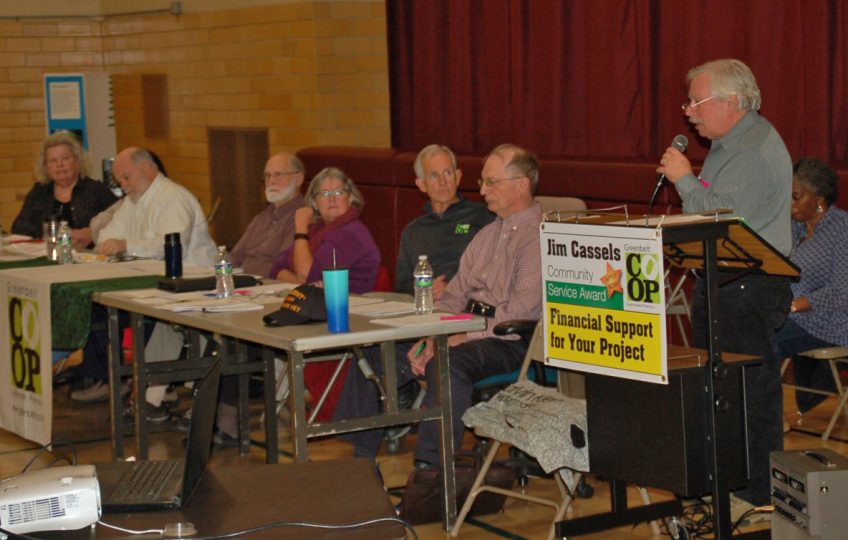Saturday, November 9, saw the Annual Membership Meeting of the Greenbelt Consumer Supermarket and Pharmacy, more colloquially known as the Co-op. Over 200 members attended, several times the usual number. Co-op has been in the news this year with its solar roof program and more recently, and less happily, with a significant loss for its financial year that ended on July 31.
The store reported a net income loss of $164,169 over its Fiscal Year 2019 – over three times the loss of $38,000 reported for 2018.
“FY19 was a bad year,” said Bill Jones, the vice chair of the Co-op board of directors. “It actually proved to be the most difficult of the 35 years that I’ve been here.”
The loss meant that there were no patronage refunds or employee bonuses or additions to retirement plans over the year, though staff did get a wage increase.
Treasurer Joe Timer pointed to a few reasons for this loss: lower total revenue due to fierce grocery market competition, higher insurance processing fees for the pharmacy and the cost of operating credit card machines.
Total annual revenue in FY19 was just over $11.8 million, which Timer says, “is the first time in 12 years we’ve been below the $12 million revenue line.”
Of the five departments that constitute total sales for Co-op, four showed revenue losses – pharmacy, grocery, meat and produce. The beer and wine department, however, showed a slight increase of less than half a percent. Pharmacy had the biggest drop, with a 5.5 percent decrease in sales.
The big hit to the Co-op’s pharmacy department was a recent change from Caremark, its insurance processor that is associated with CVS. Caremark increased its fee from $1,000 a month to $5,000 a month in the past year.
“There’s actually some federal legislation pending, indicating whether or not this is a legitimate expense,” Timer said. “Right now, we don’t have too many choices on that. There aren’t too many other service providers of that process.”
The Co-op also owes a fee to processors for its credit card transactions, amounting to 2.5 to 3 percent on each credit card sale. There is a small flat fee for debit cards.
Despite its difficulties, Co-op is moving forward with its Rays on the Roof Solar Array Project, which will replace the supermarket’s roof and install solar panels on it. Jones describes the project as “a very good investment.”
“The solar panels should produce about $60,000 in savings each year,” Jones said. “We will use most of that for the 12 years to pay off the state loan and to pay the interest on the loans from members and still return something like $20,000 a year to the store to help offset operating expenses. And after the loan is paid off, there would be about $60,000 a year for a total of 25 years or more.”
The roofing portion of the project could start next week, and will take around six weeks to complete. The solar project is set to begin in mid-to-late January and is anticipated to take two months.
As it looks forward, Co-op has plans to address the year’s loss. Store hours will be extended by the end of the year, with a 7 a.m. opening time from Monday through Saturday and a possible extension of Sunday hours. There are plans to debut a new online ordering program in January, called Mercado. “This new food shopping program will offer customers the chance to order their groceries from an extensive online catalog from the comfort of (their) own home.” Mercado will initially open with a pick-up option only but hopes to expand to a home delivery system soon after initiation.
Co-op has also formed a committee called Co-op 2.0, which will consider various options to bring new shoppers to the store and tempt current shoppers to spend more of their grocery budget there. Dorrie Bates briefed the meeting on Co-op 2.0 and its initial survey of the Co-op customers’ demographics and shopping habits. She noted that the committee’s watchword is “We’re Right Here,” reminding local shoppers of the ease of access and neighborhood feel of the store. This slogan embodies the main results of the survey that location was the most important factor for shopping at Co-op, closely followed by its neighborhood feel, it is a small business, it is a cooperative and offers friendly service.
Meeting attendees offered up many suggestions for moving forward from the loss, including charging a credit card convenience fee, encouraging patrons to donate a small amount to the Co-op upon each purchase, relying more on off-brand products and encouraging others to patronize the store (e.g. increasing the store’s visibility to non-residents who come to the Roosevelt Center for other reasons).
The Co-op unanimously elected two new members to the board at the meeting: Amy Drew, who owns a technology company, and Kim Kash, a realtor and real estate investor who founded the Greenbelt Farmers Market.
The search is on for a new general manager to replace Bob Davis, who is retiring in April. Davis received a standing ovation for his 35 years at the store.
Though FY19 represented a hit for the Co-op, it remains hopeful for the future.
“We’re doing everything we can to make sure that this Co-op is around for another 35 years,” said Timer.



